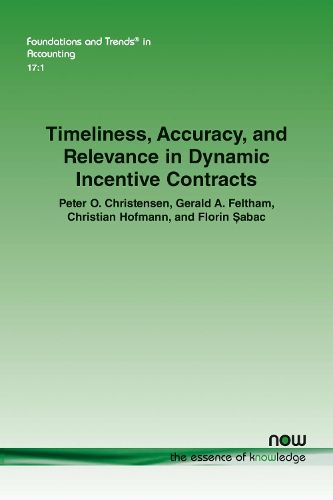Readings Newsletter
Become a Readings Member to make your shopping experience even easier.
Sign in or sign up for free!
You’re not far away from qualifying for FREE standard shipping within Australia
You’ve qualified for FREE standard shipping within Australia
The cart is loading…






This title is printed to order. This book may have been self-published. If so, we cannot guarantee the quality of the content. In the main most books will have gone through the editing process however some may not. We therefore suggest that you be aware of this before ordering this book. If in doubt check either the author or publisher’s details as we are unable to accept any returns unless they are faulty. Please contact us if you have any questions.
Timeliness, Accuracy, and Relevance in Dynamic Incentive Contracts examines managerial performance measures from the perspective of timeliness, accuracy, and relevance in multi-period incentive problems. The authors use a simple linear framework where managerial actions do not affect risk and compare and contrast consumption risk for a manager's preferences with single and multiple consumption dates, respectively.
Both full commitment to and renegotiation of long-term contracts are considered. Under full commitment, timely and accurate information is usually relevant and desirable; the only differences arise from the modeling of managerial preferences, through the manager's consumption risk. In particular, the timeliness of performance reports can be irrelevant; then, delaying reports is desirable if it can increase their accuracy. Under renegotiation of long-term contracts, the timeliness of information release relative to renegotiation is essential. Any information released prior to renegotiation is incorporated into an ex post efficient (renegotiated) contract and is particularly useful in insuring the manager against future consumption risk. Delayed reporting destroys this insurance value and can make late reports irrelevant, independent of the modeling of managerial preferences. But timely reports can create ex ante inefficient action incentives for managers, and then accuracy can be costly as well.
$9.00 standard shipping within Australia
FREE standard shipping within Australia for orders over $100.00
Express & International shipping calculated at checkout
This title is printed to order. This book may have been self-published. If so, we cannot guarantee the quality of the content. In the main most books will have gone through the editing process however some may not. We therefore suggest that you be aware of this before ordering this book. If in doubt check either the author or publisher’s details as we are unable to accept any returns unless they are faulty. Please contact us if you have any questions.
Timeliness, Accuracy, and Relevance in Dynamic Incentive Contracts examines managerial performance measures from the perspective of timeliness, accuracy, and relevance in multi-period incentive problems. The authors use a simple linear framework where managerial actions do not affect risk and compare and contrast consumption risk for a manager's preferences with single and multiple consumption dates, respectively.
Both full commitment to and renegotiation of long-term contracts are considered. Under full commitment, timely and accurate information is usually relevant and desirable; the only differences arise from the modeling of managerial preferences, through the manager's consumption risk. In particular, the timeliness of performance reports can be irrelevant; then, delaying reports is desirable if it can increase their accuracy. Under renegotiation of long-term contracts, the timeliness of information release relative to renegotiation is essential. Any information released prior to renegotiation is incorporated into an ex post efficient (renegotiated) contract and is particularly useful in insuring the manager against future consumption risk. Delayed reporting destroys this insurance value and can make late reports irrelevant, independent of the modeling of managerial preferences. But timely reports can create ex ante inefficient action incentives for managers, and then accuracy can be costly as well.